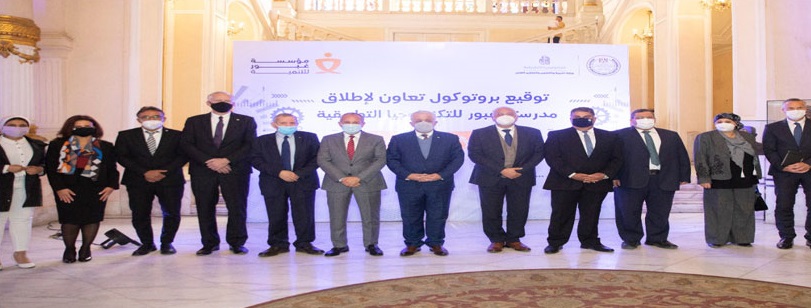The Ministry of Education signed the protocol for establishing the two Ghabbour Applied Technology School

Dr. Tariq Shawky, Minister of Education and Technical Education, today witnessed the signing of a joint cooperation protocol between the Ministry and the Ghabbour Foundation for Development. To launch the Ghabbour School for Applied Technology in the cities of May 15 and October 6 for the academic year 2021/2022, in the presence of Dr. Raouf Ghabbour, Chairman of the Board of Trustees of the Ghabbour Foundation for Development, Chairman of the Board of Directors and Managing Director of GB Auto.
The protocol was signed by Dr. Muhammad Mujahid, Deputy Minister of Education for Technical Education Affairs, and Engineer George Sidqi - Secretary General of the Ghabbour Foundation for Development and CEO of Human Resources at GB Auto, in the presence of a number of ministry leaders, including Professor Sherine Hamdy, Head of the Minister's Office Sector, and Dr. Amr Basilah, Head The Central Administration for Technical Education Development and the Director of the Applied Technology Schools Administration Unit, Dr. Muhammad Musa Emara, Head of the Technical Education Sector, and a number of the leaders of the GPU Development Foundation are Eng. Ali Serageldin, Executive Director of the Ghabbour Foundation for Development, and Mr. Khaled Taha, Vice Chairman of the Board of Directors at SES Middle East.
Dr. Tariq Shawky said that the ministry is making a lot of effort to maintain the progress of the educational process and continue developing education in Egypt to achieve the strategic vision of education 2030, which aims to provide education and training for all with high quality without discrimination, and to prepare a graduate who is able to think and who is technically, technically and technologically able, in addition to qualification Students holistically to keep pace with the requirements and skills of the twenty-first century in line with global developments.
Dr. Tarek Shawky emphasized the ministry's interest in the product and quality of technical education, and that the graduate obtained a certificate allowing him to work inside and outside Egypt, directing the addition of entrepreneurship thought to the technical education curricula To qualify students and expand their perceptions and aspirations in the field of work.
The minister affirmed that the ministry is seeking to increase the number of schools of applied technology, as the number of applied technology schools has reached 19 schools so far, and more new specializations have been included that are required by the Egyptian state, pointing out that the protocol signed today with the Ghabbour Foundation for Development is the second protocol. It will be signed this year in the field of car manufacturing and repair, because of the importance of this field and its great developmental, environmental and economic dimensions.
In a related context, Dr. Muhammed Mujahid said that the new technical education system 2.0 aims to involve industrial bodies to ensure that the needs of the local and global market are met, as well as to maintain a balanced equation between work-based learning and classroom learning to graduate competitive students with balanced personalities, skills and high abilities. What has been applied in schools of applied technology, adding that the curriculum applied in schools of applied technology is based on a merits system, and can be developed according to the needs of the labor market.
On his part, Dr. Raouf Ghabbour expressed his happiness in cooperating with the Ministry of Education and Technical Education, stressing that through our non-profit organization, we are keen to seize all possible opportunities to fulfill our national role and fulfill our responsibility towards society by harnessing all our technological capabilities and our financial and human resources to contribute to providing An added value to the Egyptian society, improving the quality of life of individuals and promoting the process of sustainable development.
As Eng. George Sidqi stated, we are striving to develop the technical education and vocational training system with the aim of improving the quality of outputs and levels of professional skill to keep pace with global standards and meet the needs of the labor market of new professions and specializations, and contribute to increasing employment rates for graduates of technical schools, which leads to a reduction in the percentage Unemployment among this group increases its role in meeting the needs required to implement economic and social development plans in Egypt, in addition to improving the stereotype of technical education graduates in Egypt.
